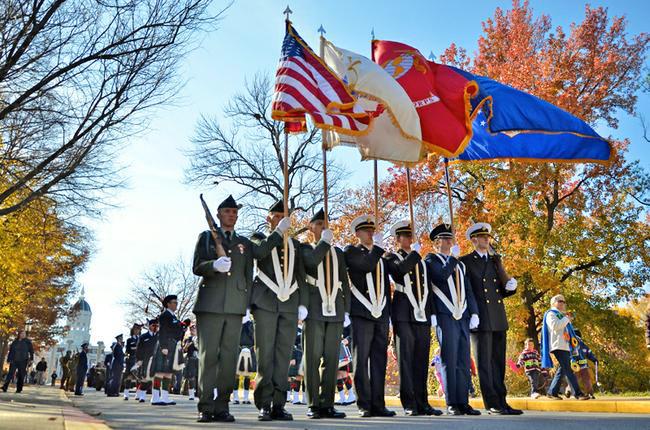
Missouri Student Veterans’ Association President Sean McLafferty and Associate Vice President Traci Howells agree that the transition from military to civilian life, especially as a student, can be very difficult.
After serving 12 years in the military, Howells began her undergraduate studies in strategic communication through the School of Journalism. She was 31 years old when she began her first semester on campus.
“I went through my whole first semester walking around campus not knowing anyone,” Howells said. “After six months of not having the connection to the military that had been a big part of my life, I felt a little bit lost.”
A current graduate student, McLafferty first became involved with MSVA when he came to MU for his undergraduate degree in the spring of 2009. After finishing his military service, he was diagnosed with post-traumatic stress disorder. According to the Department of Veterans Affairs, PTSD affects 11 to 20 percent of service members involved in recent conflicts.
“I noticed that I sat in the back right in the large lecture halls and would run into other veterans there,” McLafferty said. “That was because of open spaces and stuff like that.”
For both Howells and McLafferty, MSVA made them feel more at home because the organization allowed them to connect with people who understood what they were going through and had similar experiences in the military.
“It does create a community for giving us a place to go and people to talk to and helping us along the way with our paperwork and filing our financial aid and registering for classes,” Howells said.
McLafferty said that even though not everyone has suffered through PTSD, traumatic brain injury or other disorders, members of MSVA relate to the stories and understand military jargon that other people would most likely not understand.
“The MSVA is always there, and that’s the main reason I got involved,” McLafferty said. “If it weren’t for the MSVA and the Veterans’ Center, I would have transferred out of Mizzou.”
The MSVA characterizes itself as a “one-stop shop” for veterans, who are typically non-traditional students who return from service with a set of different experiences and expectations. The office is located in Memorial Union and is run by two full-time staff members and six work-study students who are all veterans or active duty members.
The organization works as a support system, McLafferty said. They help with mentoring, tutoring, housing, finances, and are connected with outside resources to help veterans if they need disability or health services.
Another focus of the MSVA is to give back to the community and highlight what the organization does, Howells said.
“(For) a lot of the events we’ll do a blood drive, we have a speaker coming,” Howells said. “We’ll just give other students a glimpse like ‘oh, here we are.’ A lot of students don’t even realize the veteran presence on campus. Everyone gets caught up in their little worlds. It just happens.”
One of McLafferty’s favorite examples of how MSVA gives back is Operation Free Lunch, an annual spring barbecue held on Lowry Mall where members of the organization pass out free food to students.
“It’s kind of like us trying to be part of the community,” McLafferty said.
The MSVA has expressed issues that student veterans face on campus to administration and student organizations like Graduate Professional Council and Missouri Students Association. McLafferty said they have been supportive of veterans and addressing concerns.
McLafferty used MSA as an example of outreach, as they scheduled a meeting with MSVA earlier this year to discuss concerns.
“They were like, ‘What is the concern for veterans, what are some things that we can do?’” McLafferty said. “I told them what I thought were the No. 1 concerns. Feeling embraced by the campus culture, that’s one. PTSD, TBI (traumatic brain injury), disability issues are extremely important. I never want those to go underneath the radar. They sat down with me, it was great.”
Howells believes Columbia in particular does a satisfactory job of providing resources to veterans.
“I think in this town especially and with our MSVA, we have the Mission Continues organization that really gives back a lot and gets the veterans together, we have Welcome Home homeless shelter,” Howells said. “I can’t really speak for the whole nation, but it seems that we should keep doing more for veterans.”
Howells said that when she began school, veteran graduation rates were very low. She acknowledged the barriers and stress that come with being a student veteran, but hopes that the graduation rate will continue to grow, she said.